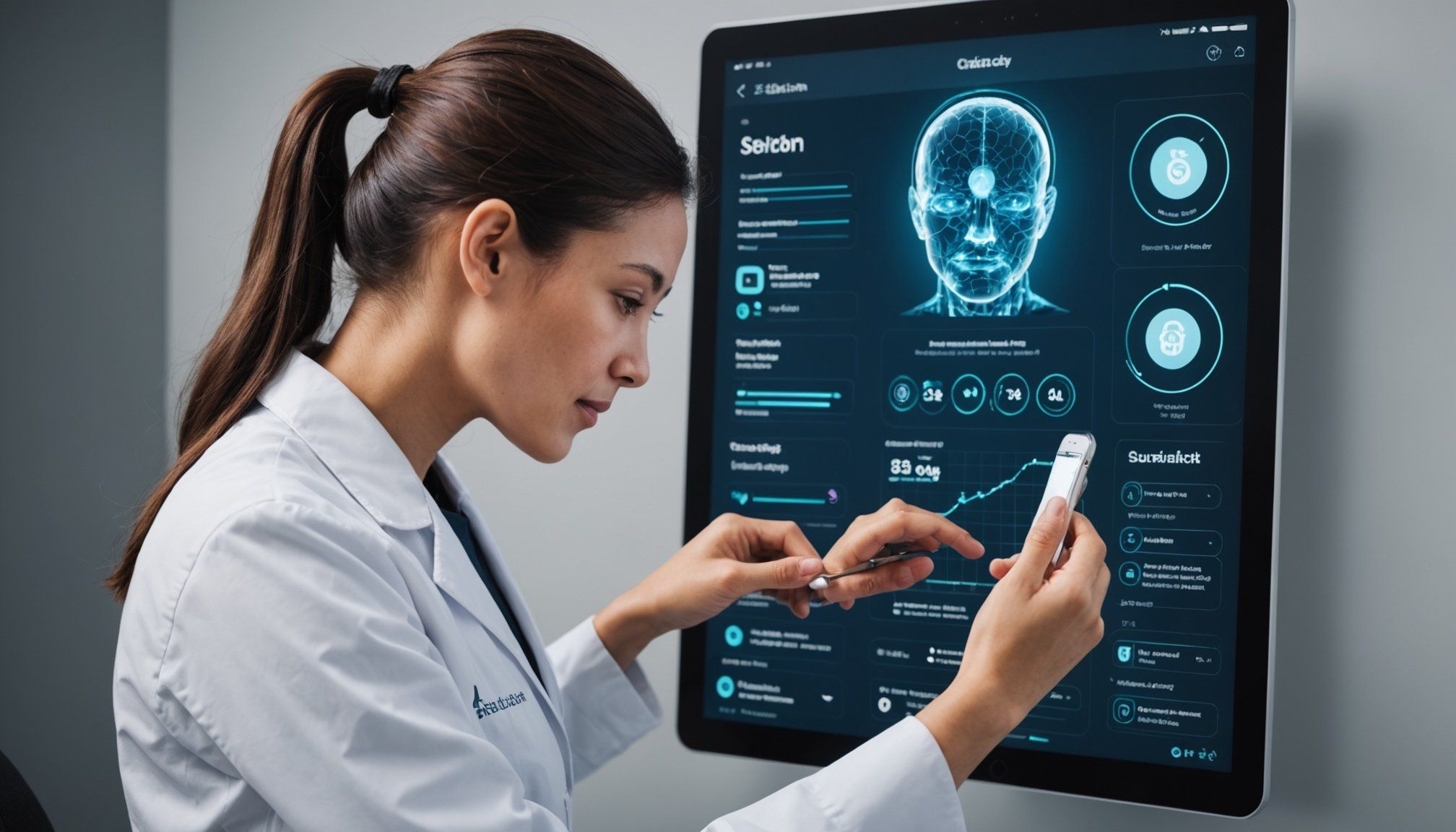Overview of AI Integration in Health Tracking Apps
The current market landscape for health tracking apps is experiencing a transformative shift with the integration of AI, enabling more tailored and effective solutions for users. AI integration significantly enhances the personalization of health tech, offering functionalities ranging from fitness tracking to chronic disease management.
The inclusion of AI allows apps to collect and analyze individual user data, thus enhancing the personalized user experience. By offering data-driven insights and recommendations, these apps provide users with more control over their health and wellness journeys. Personalization is crucial, as it increases user engagement and retention by delivering relevant content and features that align with users’ specific needs and preferences.
In parallel : Essential tactics for crafting a strong and secure machine learning workflow
However, integrating AI into health apps is not without challenges. Developers must navigate data privacy concerns, as well as the complexities of tailoring AI algorithms to diverse user profiles. Furthermore, ensuring the accuracy and reliability of AI-driven insights can be intricate but is essential in building trust with users.
Despite these challenges, the benefits of AI integration—such as improved health outcomes, greater accessibility, and enhanced user engagement—underscore its importance in the evolving landscape of health tracking applications. As technology advances, the role of AI will undoubtedly continue to expand, driving innovation in personalized health tech.
In the same genre : Unleashing ai: innovative approaches to enhance environmental monitoring systems
Key AI Functionalities in Health Tracking Applications
The integration of AI functionalities in health tracking apps has ushered in advancements that significantly enhance user experience. One pivotal feature is predictive analytics, which employs historical and real-time data to forecast health trends. This technology empowers users to proactively manage their wellness, allowing for timely interventions and informed decision-making.
Real-time monitoring forms another cornerstone of modern health tracking, bolstering user engagement by providing instant feedback on activities. This immediate insight helps maintain motivation by offering users tangible evidence of their progress or areas needing improvement. For instance, step counters or heart rate monitors update instantly, offering users a dynamic view of their health metrics.
Several case studies highlight successful AI integration in apps aimed at improving user health. For example, MyFitnessPal uses machine learning to offer personalized diet recommendations based on user input and behavior patterns. Similarly, Fitbit harnesses AI for sleep tracking, analysing patterns to give users tailored tips for better rest. These examples underscore the substantial impact of AI-driven features on user satisfaction and health outcomes, pointing to a future where technology plays an increasingly integral role in personal wellness. As AI continues to evolve, its integration into health tracking apps is expected to offer even more precise and user-friendly capabilities.
Designing User-Centric Health Tracking Apps
Creating a user experience design centered around individuals’ needs is pivotal in the success of health tracking applications. For apps to effectively utilise AI, they must incorporate customization features that enhance user engagement and satisfaction by aligning with personal goals and preferences.
Principles of User-Centric Design
One key principle of designing for users is strategic design considerations that promote usability and inclusivity. This involves intuitive navigation, accessible interfaces, and meaningful interactions. Prioritising these elements ensures that health apps are approachable and engaging, offering users a seamless experience.
Customization Features that Enhance User Experience
Customization is fundamental in creating a personalized journey within health apps. Customizable dashboards, alerts, and goal settings allow users to tailor their experience to suit their unique health and wellness objectives. This personalization fosters motivation and increases user retention.
Role of AI in Personalising User Interfaces
AI-driven user interfaces take personalization further by dynamically adapting to user behavior and preferences. For example, AI can recommend exercises or nutritional advice based on activity patterns. These AI-driven enhancements not only improve user satisfaction but also empower individuals by providing actionable insights, reinforcing AI’s role as a significant enabler of personalized health tech.
Development Frameworks for AI Health Apps
Navigating the terrain of AI-driven health tracking apps requires leveraging robust development frameworks. These frameworks play a crucial role in engineering functionality, enabling seamless technical implementation of AI features. Popular among developers are frameworks like TensorFlow, which supports extensive machine learning capabilities crucial for the smart data processing needed in health apps. Similarly, PyTorch is lauded for its flexibility, critical for personalising user interactions.
Key technical considerations involve ensuring data integrity and algorithm precision. Health apps rely heavily on user data, necessitating frameworks that uphold the highest standards of data security and privacy. Moreover, choosing a framework that facilitates the integration of real-time data analytics can significantly impact user engagement by providing up-to-date health insights.
However, integrating AI introduces challenges such as the calibration of algorithms for diverse medical data and the resource-intensive nature of developing AI models. Developers must consequently balance technological capabilities with deployment constraints, focusing on reducing computational costs and aligning AI functionalities with user expectations. By understanding these challenges and the possibilities offered by advanced frameworks, developers can foster innovations that drive the future of AI in health tracking.
Market Trends and Innovations in AI Health Tech
Market trends in AI health tech reveal a rapid evolution towards more personalised and sophisticated solutions. As health tracking evolves, the integration of AI innovations—such as advanced machine learning algorithms—paves the way for more adaptive applications. These technological advancements are designed to cater to users’ unique health requirements.
A significant shift in consumer behaviour highlights the growing demand for personalised health solutions. Users increasingly favour apps that can offer insights tailored specifically to their lifestyles and health needs. This shift is largely driven by the capacity of AI to analyse vast amounts of data, offering users a comprehensive understanding of their health.
Emerging trends also showcase innovations in predictive analytics and real-time monitoring, technologies that are becoming indispensable in modern health applications. They enable the early detection of health issues and provide users with timely interventions, greatly enhancing user satisfaction and trust.
Looking ahead, the future of health tracking apps is set to be dominated by AI-driven, high-precision solutions. These advancements promise not only to refine and enhance user experiences but also to revolutionise how individuals manage their health, providing a more proactive approach to wellness.
Enhancing Performance through AI Strategies
In the competitive field of health tracking apps, app performance can be significantly boosted by employing robust AI strategies. One of the key strategies is increasing user engagement by tailoring interactions based on personal data, encouraging users to keep using the app. Techniques such as personalized notifications and content can play a pivotal role in retaining users over the long term.
Strategies for Increasing User Retention
Implementing AI-powered strategies can effectively improve user retention. Apps utilizing AI to analyze user behavior patterns can adapt and respond proactively, showing relevant information when needed most. By recognizing user preferences, apps can ensure continual relevance and increase loyalty.
Leveraging Data for Continuous Improvement
AI integration enables apps to leverage extensive user data for continuous improvement. This involves using predictive analytics to anticipate user needs and maintain app performance. By understanding patterns and preferences from past interactions, developers can streamline app operations and introduce new features aligned with user demands.
Importance of Feedback Loops in App Development
Utilising feedback loops is vital in AI optimization. Real-time user feedback allows developers to make iterative refinements, enhancing app functionality and user satisfaction swiftly. Incorporating instant feedback mechanisms ensures that improvements are user-driven, sustaining engagement.











